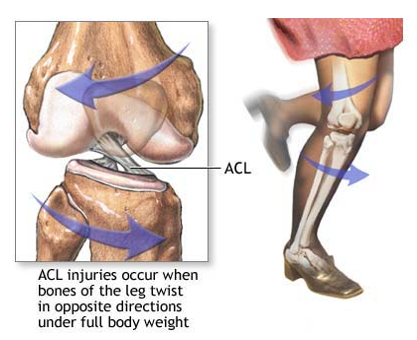 The knee joint itself involves a multitude of structures to keep it stable and strong. The Anterior Cruciate Ligament (ACL) is one such structure that helps achieve these objectives. It originates from the posterior (back) part of the femur and attaches to the anterior (front) part of the tibia. The Posterior Cruciate Ligament (PCL) meanwhile, originates from the anterior part of the femur and attaches to the posterior part of the tibia. These two ligaments crosses in the middle and provide specific stabilities to the knee.
The knee joint itself involves a multitude of structures to keep it stable and strong. The Anterior Cruciate Ligament (ACL) is one such structure that helps achieve these objectives. It originates from the posterior (back) part of the femur and attaches to the anterior (front) part of the tibia. The Posterior Cruciate Ligament (PCL) meanwhile, originates from the anterior part of the femur and attaches to the posterior part of the tibia. These two ligaments crosses in the middle and provide specific stabilities to the knee.
The ACL is important in securing the knee joint by preventing the forward movement and rotation of the tibia (lower leg bone) in respect of the femur (thigh bone).
There are many ways that a knee can be injured. On the one hand, there could be an obvious traumatic incident, where you were tackled while playing football. On the other hand, it could also be due to an inconspicuous activity, where you were simply running and trying to turn one way and injured yourself.
Most ACL injuries, in fact, are done via the later method. There may also have been a factor of jumping/landing prior to the injury.
A full tear of the ACL, may actually not cause significant amount of pain in some cases. In fact, some athletes would feel that they can continue their sporting commitments, only to find themselves unable to perform due to significant instability in the knee joint.
It is highly suggested that you stop your activities and seek diagnosis immediately. Our physios at Capital Physiotherapy are trained to ensure you get the correct diagnosis first and foremost. They will spend the time that is required to make you feel at ease and give you the correct advice that you need. Our appointments are 1-on-1 which ensures you get the most out of your physiotherapy sessions. A treatment plan will be drafted for you, so that you can go back to your best quickly! Capital Physiotherapy is also able to get you crutches as well as braces if required.
In the meantime, make sure you RICE; Rest, Ice, Compression and Elevation!

